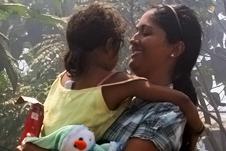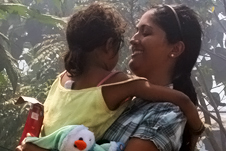Spring break in Nicaragua


By Ron Hartung
March 2011
The students from FSUCares were not the only College of Medicine service-learning participants during spring break. Sixteen students associated with SIGH (Students Interested in Global Health) were in Nicaragua as part of a new partnership with the village of Los Cedros.
“My passion to serve the underserved has been renewed,” said student Naomi Salz.
Although the College of Medicine has a variety of relationships with communities internationally, the Nicaragua partnership is different, said Dan Van Durme, M.D., director of the college’s Center on Global Health and SIGH’s faculty advisor. The spring break trip to Los Cedros was the first of four trips planned for this year – and beyond.
“December 2010 was when we told the people of Los Cedros, ‘We would like to enter into this long-term, sustainable, community-health improvement partnership with you,’” said Van Durme, M.D., chair of the Department of Family Medicine and Rural Health. That partnership differs from what he called “medical brigade” trips, in which health teams fly in, provide care, fly out and perhaps never return. “We told them in December, ‘We’ll be back in March. You can count on it.’ We talked to them about it being a partnership, not a unilateral charity. We taught the students about moving beyond just a community needs assessment but combining that with a community asset analysis: ‘What do you have in the community? How can we work within those assets?’”
Recently, Van Durme said, a Florida State University Foundation fund was set up to accept donations for the Nicaragua trips. But so far, participants traveling to Los Cedros have paid out of their own pocket. With airfare, room and board, plus $100-$125 apiece donated to buy medicines and supplies, the tab added up to about $1,100 each. The medicines are nothing fancy.
“A lot of what we do there is over-the-counter: Tylenol, ibuprofen or antacids,” Van Durme said. The people can’t afford those medicines, which usually aren’t available in Los Cedros anyway.
The College of Medicine teams, which also include residents and faculty from the Tallahassee Memorial Hospital Family Medicine Residency Program, stay at a guest house about 30 minutes from Managua. Called Open Hearts Ministries, it’s operated by missionaries Michael and Susan Buzbee, former residents of the Jefferson County town of Waukeenah. Since 1996 the Buzbees have lived in Nicaragua. In addition to doing their own ministry work, they provide room, board and meals to visiting outreach groups.
“Quite honestly, we couldn’t dream of doing this without the Buzbees there,” Van Durme said. For one thing, they steered him toward Los Cedros, a village of roughly 6,000 people. “No. 2, they are our base of operations. When we go, we don’t have to worry about whether the students will be safe, whether the water will be drinkable, whether the food will be edible, etc., etc. We stay right at their facilities. And the fact that they’re avid Seminole fans is a huge added bonus.”
Van Durme didn’t participate in the March 5-12 trip. José E. Rodríguez, M.D., associate professor of family medicine and rural health, was one of the faculty leaders.
“Most of the places we visited had dirt floors, cooking over open fires, outdoor latrines and outdoor ‘rooms’ where people would ‘bathe,’” Rodríguez said. “Almost all of them had to manually draw water from a well, so there was no running water for baths, for drinking or for washing clothes or dishes. Everything that these people did was done by hand.
“A few of the homes we visited had electricity, which came from the utility poles in a way that can only be explained as dangerous. I imagine that most of the people were unfortunately using electricity without the knowledge of the electric company. The residents told us how much they made ($136 per month, if they had work), what they did (most were day laborers, etc.), how long they worked (eight-12 hours a day), and how they received medical care.
“It was amazing to see families of 10 people living in sheltered spaces smaller than 10 feet by 10 feet. Even my experiences in visiting Ecuador, Nicaragua and Guatemala had not prepared me for what I saw in this community. Many of our students had life-changing experiences, because they had never experienced such drastic poverty up close.”
Salz, a second-year student, said the home visits were the most meaningful part of the trip.
“It gave me better insight into the obstacles they face daily,” she said. “The primitive conditions they live in, the dirt that stains their skin, the stench of burning trash, worm-laden dogs and wandering cows all paint a stark picture I will not soon forget.”
But that’s not all she’ll remember.
“The trip to Los Cedros reminded me of why I wanted to be a doctor in the first place,” Salz said. “The genuine appreciation I felt from them was overwhelming. Things we regard as insignificant – vitamins, soap and Tylenol – make a difference in the quality of their lives.”
To those who say that U.S. students should be healing people here at home rather than in Nicaragua, Van Durme testifies to what studies have indicated: “The students who participate in global health outreach projects are more likely to participate back home.” For them it’s not an either-or choice, he said – it’s both.
Another value of the trips, he said, is this: “Students get a much bigger sense that the health of a community is related to the water, the sanitation, access to healthy food, the nutritional state of the children, etc. And it’s tied to a bigger level of governmental policies and the broader economic issues of global poverty – beyond simply, ‘You had a parasite and I gave you a parasite drug.’”
Here are the College of Medicine representatives who made the March trip to Los Cedros:
• Faculty – Luckey Dunn, M.D., Daytona Beach Regional Campus dean; Suzanne Harrison, M.D., family medicine education director; and Rodríguez, M.D.
• Class of 2011: Nicole Meisner.
• Class of 2013: Salz, Joshua Smith.
• Class of 2014 – Shawn Akhavan, Kush Bhorania, Matthew Clark, Michael Dender, Jens Flock, Loan Hoang, Alexandra Mannix, Alexandra Rocha, Chirley Rodriguez, Sweta Sengupta, Ann Sheddan and Sanam Zahedi.
• Pre-med: Clint Dunn (son of Luckey Dunn), Honors Medical Scholar.
The Global Health Education Enhancement Fund has been set up to accept donations for the College of Medicine’s Nicaragua partnership. To donate, make your check payable to the FSU Foundation; in the memo line, write Global Health -- Fund #7470. Mail it to:
College of Medicine
The Florida State University
PO Box 3064300
Tallahassee, FL 32306-4300
Attn: Wayne Munson

